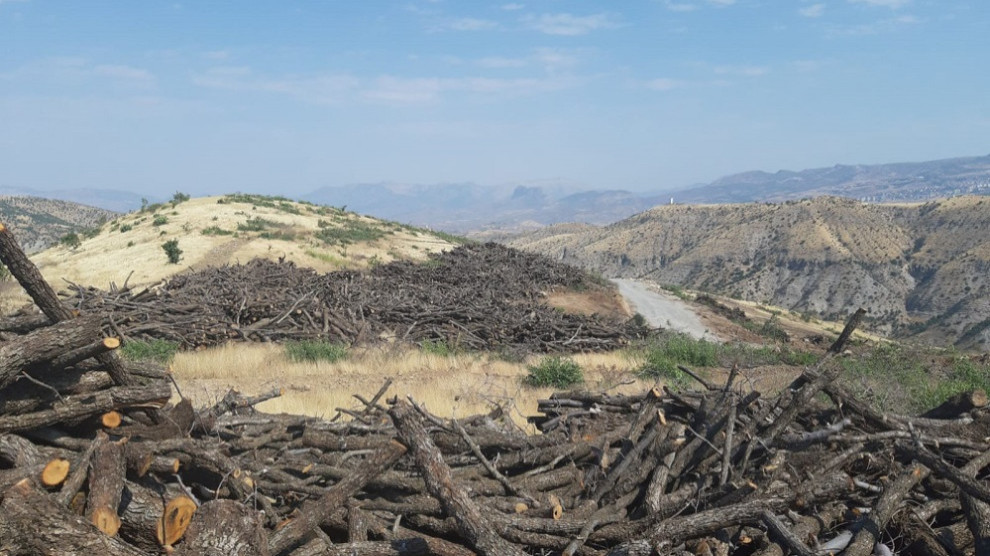E26/10/2024
Since Wednesday, October 23, 2024, the Turkish state has been bombing Sinjar, the Yazidi center
devastated by ISIS, as well as civilian areas in northeastern Syria. Citing an attack in Ankara, allegedly
carried out by the Kurdistan Workers’ Party (PKK), Turkey has launched indiscriminate bombings on
civilian zones in northeastern Syria. These attacks have hit bakeries, flour warehouses, gas stations,
highways, oil wells, and power stations using drones, warplanes, and howitzers.
The bombings have specifically targeted Kobani, Amuda, Qamishli, Rimelan, and Tel Rifaat along the
Turkish border, impacting civilians, especially women and children. Over four days of attacks by
Turkey, 15 civilians and two security personnel have died, with 39 civilians and nine security
personnel injured.
Mazloum Abdi, the General Commander of the Syrian Democratic Forces (SDF), stated, “They claim
that the attackers entered Turkey from Syrian territory. Our forces have no connection with this
attack, and none of the attackers crossed over from Syrian territory. Turkey cannot prove this. We
decided not to engage in operations within Turkey and Northern Kurdistan, limiting our efforts to
Syrian territory. We have often tried to resolve our issues through dialogue.” The People’s Defense
Forces (HPG) claimed responsibility for the Ankara attack in a statement on October 25, clarifying
there is no link to northeastern Syria or Sinjar.
Turkey has used “terrorism” and “threats from the southern borders” as pretexts to apply similar
policies in all Kurdish regions. Just as in Afrin, Tel Abyad, and Serekaniye, military operations in these
areas allow Turkey to alter demographics, establish Turkish cultural institutions, and dismantle
Kurdish organizations. In Iraq, conditions have not reached the same stage as in northeastern Syria, so
Turkey currently maintains a military presence there under the guise of “eradicating terror.” The
primary objective of these policies is to expand and implement the Misak-ı Milli (National Pact)
borders through a strategy targeting Kurdish-majority regions, aiming at the erasure of Kurdish
identity.
The Turkish state conducted similar attacks on January 13, 2024, targeting infrastructure and civilian
areas in northeastern Syria. During these attacks, Turkish forces rendered key power stations
inoperative. Dirbesiye’s power station was hit twice, Amuda’s once, Qamishli’s twice, and Tirbespiye’s
twice, leaving four power stations completely non-functional.
The Sewedik power station, an electricity hub, had all 12 turbines rendered unusable, with all
transformers and supporting smaller stations disabled. The Sewedik gas station, targeted four times,
was also left inoperative, halting all LPG production. Turkey’s actions cut electricity for 2,230 villages
in Derik, Girke Lege, Rimelan, Chilaxa, Tirbespiye, Qamishli, Amuda, Tel Kocher, and Tel Hemis. In the
Euphrates Canton, power was cut to 300 villages in Ain Issa.
Kobani’s power station, supplying 30 MW to the city center and 360 surrounding villages, was
similarly disabled. Altogether, 660 villages connected to Ain Issa and Kobani were left without
electricity. Tirbespiye was severely affected, with 182 villages left without power or water, except
those with large generators providing five hours of electricity per day.
Water stations and wells also stopped functioning due to the attacks. Of the 450 drinking water wells
in the Cizire Canton, only 124 remain operational. The Sefan Station, which provided water to Deir
al-Zor, Girke Lege, Chilaxa, Tirbespiye, and Qamishli, was disabled. The Hilêliye water station, serving
75% of Qamishli’s population, became inoperable due to power outages, as did the Ceqceq and
Uwece stations.
Education at Risk for Over 865,380 Students
During attacks from December 23 to 25, 2023, Turkey targeted five schools in Cizire Canton.
According to a December 28 statement from the Democratic Autonomous Administration’s Education
and Learning Committee, 712 schools in Cizire, Euphrates, and Afrin-Shahba Cantons suspended
classes, affecting 89,418 students.
The 2024-2025 academic year began on September 8 for elementary, middle, and high school
students, and on October 6 for university students. Approximately 4,775 university students and 605
students in teacher training, medical academies, and the School of Fine Arts are enrolled. In total,
over 860,000 students, guided by 41,000 teachers across 4,120 schools, have resumed classes.
However, due to conflict-damaged facilities, only 4,100 schools are currently active. The ongoing
attacks pose a serious threat to education, preventing a stable learning environment for more than
865,380 students in the region.
Bombardments from October 23, 2024
Turkey targeted border regions including Kobani, Amuda, Qamishli, Rimelan, and Tel Rifaat. Between
October 23 and 25, Turkey conducted 99 reconnaissance flights, 13 airstrikes, and 573 artillery
shellings, totaling 685 attacks. On October 23, seven civilian workers were killed in an attack on the
Siwediyah oil station in Kocerate, Derik. On October 24, Kobani’s service centers and grain storage
facilities were bombed, resulting in worker Hisein El Deas’s death and seven injuries.
Other significant casualties include:
● October 25: 8-year-old Ekina Hesino and 50-year-old Mihemed Delf were injured in Til Temir.
● October 26: Three women were injured in a bakery and cheese factory bombing in Derik.
Call for Action
This report demonstrates that Turkey’s targeting of infrastructure and civilian areas in northeastern
Syria constitutes crimes against civilians. Turkey aims to depopulate Kurdish-dominated areas and
resettle Syrian refugees from Turkey, repeating its policies in other occupied areas in northeastern
Syria.
The Geneva Kurdish Human Rights Center calls on the United Nations High Commissioner for Human
Rights to take immediate action against Turkey’s civilian-targeted attacks. We urge the relevant UN
mechanisms to prevent further casualties and advocate for a no-fly zone over northeastern Syria to
safeguard civilian lives.
15, Rue des Savoises1205 Genève Tel (022) 328 19 84
Email: info@kurd-chr.ch /kurd.chr.geneve@gmail.comWeb: www.kurd-chr.ch



